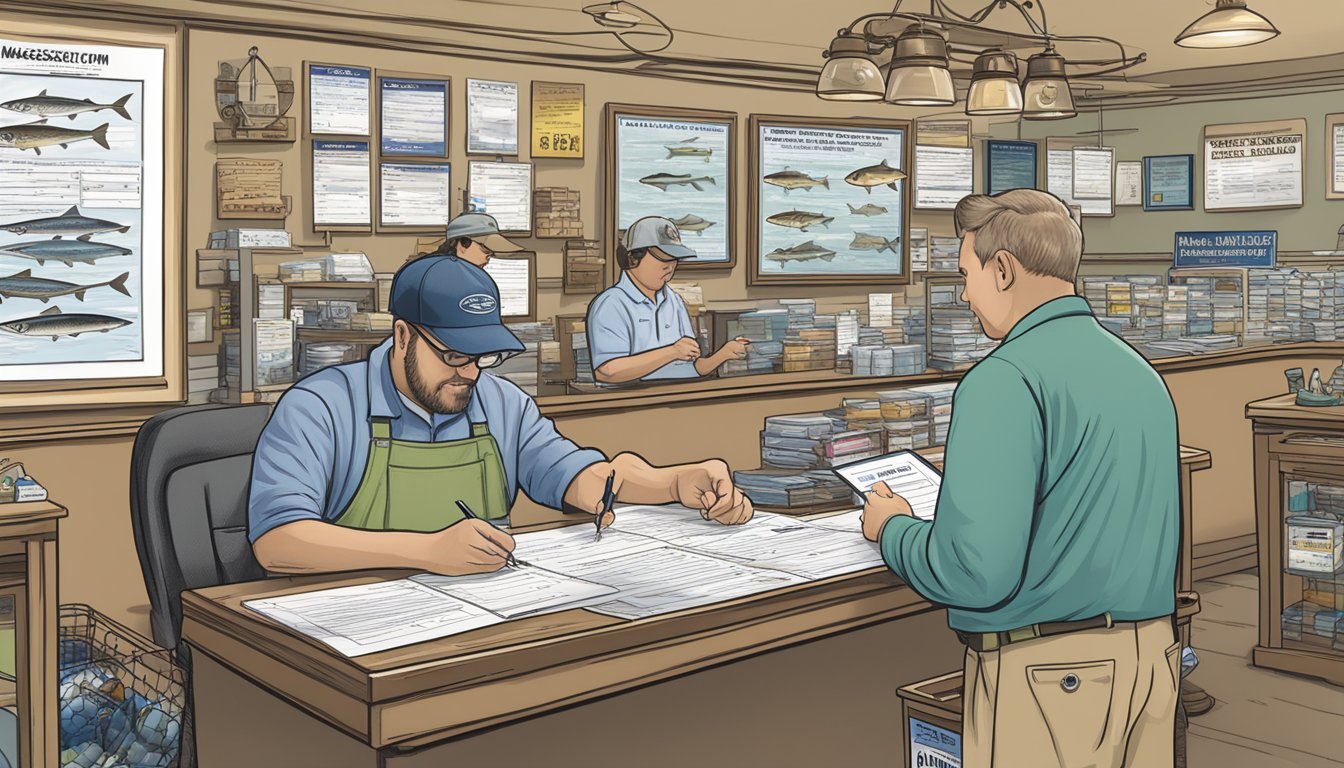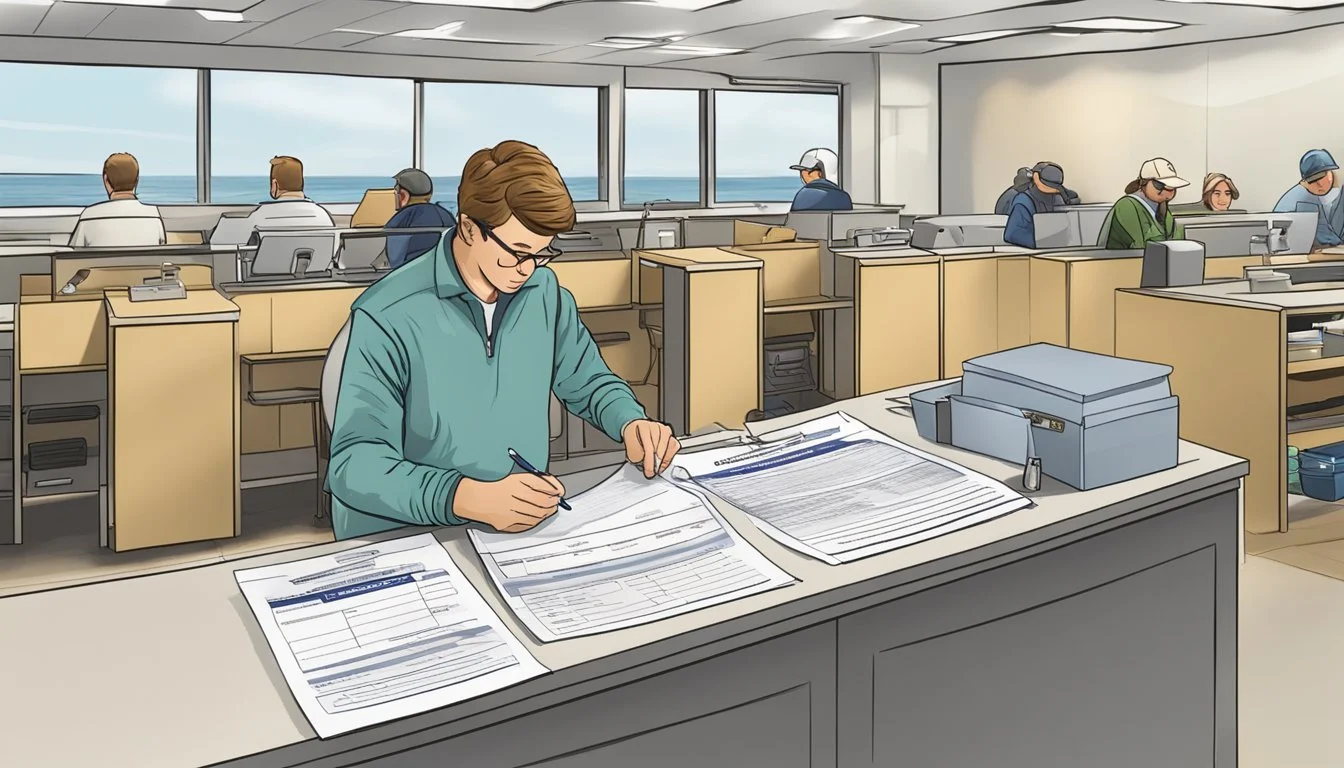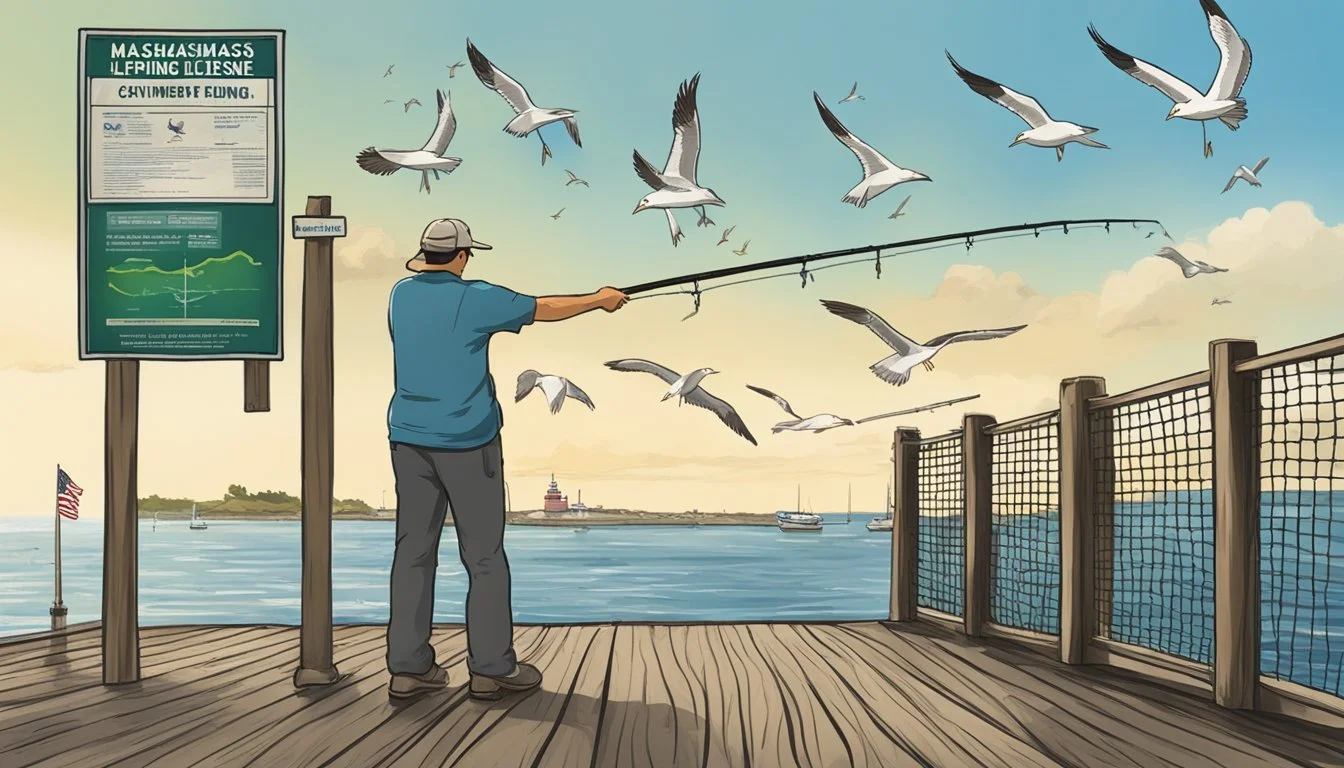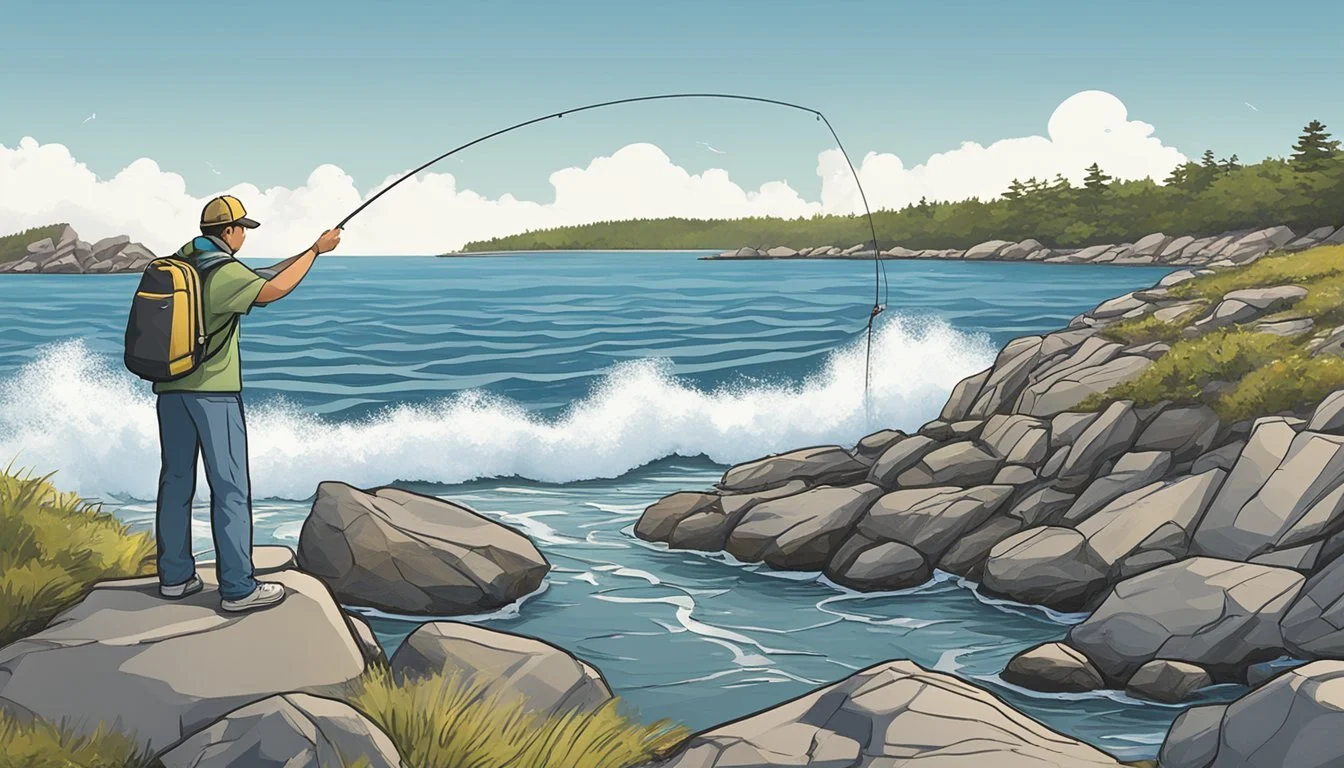How to Get a Massachusetts Saltwater Fishing License
A Step-by-Step Guide
Anglers looking to explore the rich coastal waters of Massachusetts will need to secure a saltwater fishing permit before casting their lines. The process is streamlined through the MassFishHunt portal, an online service that connects fishers with the necessary licensing. Regardless of fishing from the shoreline, a vessel, or even a bridge spanning Massachusetts' expansive 1,500 miles of coastline, a permit is required for compliance with state regulations.
The commonwealth offers a convenient online purchase system where anglers aged 16-59 can obtain their permits. This system is also available to those who are 60 years of age and older, with the added benefit that they are not charged for their license. A fishing permit is not just regulatory but also a contributor to conservation efforts, with the funds being used to maintain the aquatic ecosystems and ensure sustainable fishing practices.
Once received, the permit must be readily available, whether in printed form or stored on a mobile device, for the duration of any saltwater fishing activity within state boundaries. The permit ensures that all individuals fishing in saltwater territories adhere to the current fishing laws and contributes to the preservation and study of Massachusetts's marine resources.
Understanding Fishing Licenses in Massachusetts
In Massachusetts, anglers must hold the appropriate fishing license to legally enjoy the sport. The type of license required varies based on the water body being fished—saltwater or freshwater—and adheres to conservation efforts through fees like the Wildlands Conservation Stamp.
Differences Between Saltwater and Freshwater Licenses
Saltwater and freshwater fishing licenses cater to two distinct ecosystems. A saltwater fishing license, officially known as the Recreational Saltwater Fishing Permit, is specifically for marine environments. Conversely, a freshwater fishing license is necessary for inland waterways. These licenses are managed through separate regulations and fees, reflecting the unique conservation needs of each habitat.
Saltwater Fishing License Overview
The Recreational Saltwater Fishing Permit in Massachusetts is mandatory for anyone looking to fish (What wine goes well with fish?) in the state's coastal waters. This requirement holds for individuals aged 16 and older. Anglers can acquire their permits via an online portal, MassFishHunt, allowing for easy access and management of their licenses. Permits can be printed or displayed on a mobile device, and must be possessed at all times while fishing.
Annual Resident License Fee: Variable
Annual Non-Resident License Fee: Higher than resident fee
Relevance of Wildlands Conservation Stamp
The Wildlands Conservation Stamp plays a critical role in conservation efforts across Massachusetts. This $5 stamp is an additional fee added to the first resident freshwater fishing license purchased each year and to all non-resident licenses, regardless of whether they are for saltwater or freshwater fishing. This fee supports the protection of critical habitats and ensures the continued health and accessibility of the state's natural resources for future generations.
Eligibility Criteria
To obtain a Massachusetts saltwater fishing license, the applicant must meet specific eligibility criteria. These requirements vary based on residency status and age.
Resident vs. Non-Resident Requirements
Residents and non-residents face the same process for acquiring a saltwater fishing permit in Massachusetts. There is no differentiation in cost; the permit fee applies equally to both groups. However, all applicants must provide accurate personal information to complete the application process.
Age and Disability Considerations
The age requirement for a saltwater fishing permit in Massachusetts is that any person 16 years or older must have a license. There are no fees for anglers who are 60 years and older, yet they are still obligated to possess a permit. For disabled persons, while there may be no specific age exemption provided, obtaining a permit follows the standard guidelines, and accommodations for disability are considered on an individual basis.
How to Purchase a Saltwater Fishing License
Purchasing a saltwater fishing license in Massachusetts is a straightforward process that can be completed online, in person, or by mail. The following subsections detail the steps for each method.
Online Registration through MassFishHunt
Individuals can register for a saltwater fishing license through the MassFishHunt portal. They will need to provide personal details and have a debit or credit card ready for payment. Upon completion, licenses can be printed directly from a mobile device or computer. An additional administrative fee may apply for online transactions.
In-Person Registration
For those preferring direct interaction, license agent locations across Massachusetts offer in-person registration services. These vendor locations assist applicants in completing the registration process, accept payment, and provide the option to immediately print or re-print their saltwater fishing license.
Paper Application Process
Applicants also have the option to apply via a paper application. The completed form must be mailed to the designated address along with the necessary fees. Payment can be made through a debit or credit card or by check. Once processed, the license will be mailed to the applicant. This method may take longer than online or in-person registration.
License Costs and Fees
In Massachusetts, both residents and non-residents are required to obtain a fishing permit for saltwater fishing activities. The costs associated with these licenses are straightforward and vary depending on residency status. There are also provisions for discounts and free licenses under certain conditions.
Resident License Fee
For Massachusetts residents, the annual saltwater fishing permit fee is $10. This permit is necessary for individuals to fish in the state's coastal waters and estuaries.
Non-Resident License Fee
Non-resident anglers are also subject to a $10 annual fee for their saltwater fishing permit, aligning with the cost for residents. This permit grants the same fishing privileges to non-residents who are fishing in Massachusetts waters.
Discounts and Free Licenses
Discounted or free fishing permits are available in specific cases. Residents who are aged 60 and over can obtain a saltwater fishing permit at no charge, though a $1.68 administrative and convenience fee is applicable. It should be noted that there are no lifetime fishing licenses available; all permits, whether free or purchased, expire on December 31st of each year and must be renewed annually.
Regulations and Compliance
Massachusetts saltwater fishing license holders must adhere strictly to state regulations and compliance measures to maintain the balance of marine life and ensure public access to fishing remains sustainable. These regulations vary by species and can include specific catch limits and legal fishing seasons.
Understanding Massachusetts Fishing Regulations
Massachusetts imposes a variety of fishing regulations that anglers must follow. Regulations often include licensing requirements, permitted fishing areas, and mandated reporting for certain species. Striped bass, for example, has specific regulations due to its popularity and vulnerability to overfishing. It's important for fishermen to familiarize themselves with these rules to avoid violations.
Species-Specific Guidelines and Catch Limits
Catch limits and size restrictions are determined by the species and are enforced to prevent overharvesting. For instance:
Striped Bass: Must be at least 28 inches in total length.
Black Sea Bass: Size and catch limits are specified yearly.
Fishermen should consult the latest Massachusetts regulations for each season, as these guidelines can change based on the conservation needs identified by marine biologists and state officials.
Penalties for Violations
Non-compliance with Massachusetts fishing regulations can result in penalties. Penalties might include fines, license suspension, or even criminal charges for serious infractions. Enforcement ensures that the sustainability of fish species and their environments are protected for future generations.
Reciprocity and Additional Permits
Massachusetts offers reciprocity agreements with several neighboring states for saltwater fishing, and additional permits may be necessary for specific types of fishing, such as targeting highly migratory species or engaging in lobstering and shellfishing.
State Reciprocity Agreements
Massachusetts has established reciprocity agreements with New Hampshire, Rhode Island, Connecticut, and, to a lesser extent, Maine. These agreements allow for:
MA permit holders to fish in NH, RI, CT, and partially in ME waters.
NH, RI, CT permit holders have reciprocity to fish in MA waters.
Example Reciprocity Agreements:
New Hampshire: MA to NH and NH to MA
Rhode Island: MA to RI and RI to MA
Connecticut: MA to CT and CT to MA
Maine: MA to ME only
This effectively expands the angling opportunities for fishermen in the New England region and simplifies regulations for those fishing in Atlantic coastal waters.
Special Permits for Specific Fisheries
Certain fisheries in Massachusetts require special permits on top of the standard saltwater fishing license:
Atlantic Highly Migratory Species Permit: Necessary for anglers targeting species such as sharks, swordfish, and tunas.
Lobstering and Shellfishing: Separate permits are required for harvesting lobsters (What wine goes well with lobster?) and shellfish such as clams (What wine goes well with clams?)and oysters.
Permits required for specific activities:
Highly migratory species: Atlantic Highly Migratory Species Permit
Lobstering: Separate lobstering permit
Shellfishing: Separate shellfishing permit
It is imperative for anglers to be aware of and comply with these additional permit requirements to maintain sustainability and adhere to conservation efforts within the state's fisheries.
Fishing Locations and Access
Massachusetts offers an extensive coastline with diverse fishing locations. Anglers have access to numerous fishing piers, reservoirs, and streams, as well as boat launches that provide gateways to both inshore and offshore fishing adventures.
Popular Coastal Fishing Destinations
Massachusetts boasts over 1,500 miles of stunning coastline that provides ample opportunities for saltwater fishing. Two noteworthy cities that serve as hubs for anglers are Gloucester and New Bedford. Gloucester, often revered for its deep-sea fishing, lies to the northeast of Boston and gives access to Atlantic delicacies such as cod, haddock, and bluefin tuna. New Bedford, to the south, offers access to a variety of species and is known for its rich fishing heritage.
Access to Piers, Streams and Reservoirs
Fishing piers provide anglers without boats convenient spots to fish, and Massachusetts has several accessible along its shores. Streams and reservoirs managed by MassWildlife extend fishing opportunities into freshwater territories. Artificial reefs have also been developed to enhance marine habitat and fish populations. These inland and coastal public access points are regularly maintained to ensure they offer reliable, safe fishing experiences.
Boat Launches and For-Hire Vessels
For those looking to venture beyond the shore, boat launches are located throughout the coastline. These facilities accommodate a range of watercraft, allowing for a smooth transition from land to sea. Additionally, there are numerous for-hire vessels available for anglers seeking a guided fishing adventure. These boats often come with experienced crews knowledgeable in local fishing spots and regulations, ensuring a comprehensive maritime experience.
Maintenance of Fishing License
Massachusetts saltwater fishing licenses require periodic attention to remain valid. License holders are responsible for keeping track of expiration dates and ensuring their permits are intact and accessible when fishing.
Renewal and Expiration Dates
Renewal: The Massachusetts saltwater fishing permit typically expires on December 31 of each year. License holders should renew their permits annually to maintain legality when fishing in the new year.
Expiration Dates: It is crucial for anglers to remember that December 31 is the uniform expiration date for these fishing permits. Marking this date on calendars or setting reminders can help avoid inadvertent lapses.
Replacing Lost or Damaged Licenses
Lost Licenses: In events where a fishing permit is lost, anglers can print or re-print the permit at any time by logging into their MassFishHunt account and selecting the appropriate option.
Damage Control: If the license becomes damaged, the same re-printing process applies, ensuring that a legible copy of the permit is always available. Additionally, having a version of the permit stored on a mobile device is a practical approach for easy access and display when required.
Contributing to Conservation
Purchasing a Massachusetts saltwater fishing license not only grants anglers the right to fish but also serves as a contribution to vital conservation efforts. The funds collected are instrumental in supporting the sustainability of fish populations and marine habitats.
Understanding Conservation Efforts
Massachusetts is dedicated to the conservation of its marine ecosystems and the long-term sustainability of fish populations. The Massachusetts Division of Marine Fisheries manages these efforts by conducting research, habitat protection, and regulatory enforcement. License fees directly support these initiatives. A key component involved in the conservation strategy is the Wildlands Conservation Stamp, which is included with all sporting licenses. This stamp specifically funds the purchase and preservation of wildlands, providing critical habitat for wildlife, including fish species.
Voluntary Donations and Feedback
Anglers have the opportunity to engage further in conserving marine life by providing voluntary donations in addition to the license fee. When purchasing a license through the Mass.gov portal, there is an option to contribute to the Massachusetts Endangered Species Act Non-game Wildlife Fund, amplifying the impact on conservation.
Additionally, anglers can offer valuable feedback on their experiences and observations, which can inform state conservation strategies. Feedback mechanisms through Mass.gov help authorities understand the efficacy of current regulations and the needs of both the environment and the recreational fishing community. This input is pivotal and ensures adaptive management of Massachusetts's marine resources, aligning regulatory measures with the actual conditions of fish populations and fishing activities.
Additional Recreational Opportunities
In addition to saltwater fishing, Massachusetts offers a range of outdoor activities, including freshwater fishing and hunting, which require their own permits and licenses.
Freshwater Fishing and Hunting
For those interested in freshwater fishing, Massachusetts boasts numerous freshwater lakes and rivers. Individuals must obtain a separate freshwater fishing license, which is regulated by the Division of Fisheries and Wildlife (DFW). Anglers can explore fishing opportunities at the Quabbin Reservoir, including the special Quabbin one-day freshwater fishing permit. Besides fishing, the DFW also manages hunting seasons and trapping, offering licenses for various game species.
Specialized Fishing Charters and Guides
Fishing charters and guides provide personalized fishing experiences in both saltwater and freshwater settings. They cater to all skill levels, offering expert advice, access to prime fishing spots, and sometimes the necessary equipment. Whether targeting specific fish species or exploring the scenic coastlines and lakes, these charted excursions can enrich the recreational fishing experience.
Contact and Support Resources
When seeking assistance for obtaining a Massachusetts saltwater fishing permit, two primary entities provide comprehensive support: the MassWildlife and the Division of Marine Fisheries. They offer resources for application processing and answer questions about regulations and requirements.
MassWildlife and Division of Marine Fisheries Offices
The MassWildlife Office serves as a hub for fishing, hunting, and trapping permits in Massachusetts. Individuals can contact their local office for support or visit in person. The Division of Marine Fisheries, especially relevant for saltwater anglers, operates from various regional offices, including one on Cape Cod, providing targeted assistance for marine regulations.
Contact Information:
MassWildlife Office: Can be reached at (508) 389-6300.
Division of Marine Fisheries: Specific offices are listed on their official website.
Application and Regulation Inquiries
For queries specific to the application form for a saltwater fishing permit, individuals are encouraged to utilize the MassFishHunt online portal. The system guides users through the steps required to obtain their permit. Regulation inquiries, including size and catch limits or seasonal regulations, are updated and provided by the Division of Marine Fisheries.
Resources for Assistance:
Application Form: Assistance available through the MassFishHunt portal.
Regulation Inquiries: Updated information can be found on the Division of Marine Fisheries website or by contacting them directly.












